ISLAMABAD: With porous borders, creaking hospitals and large illiterate populations, Afghanistan and Pakistan face a potentially devastating health crisis after the new coronavirus erupted in neighboring Iran.
Islamabad has closed official border crossings while Kabul has suspended all travel to the Islamic republic, which has reported 15 deaths out of nearly 100 infections -- making it one of the hardest-hit countries outside the virus epicenter China.
But experts fear the measures could prove ineffective with thousands of people -- refugees fleeing violence, Shiite pilgrims, smugglers, and migrants looking for work -- likely crossing the long, poorly patrolled frontiers every day.
The virus has spread to more than 25 countries, killing over 2,700 and infecting 80,000, mostly in China. But new outbreaks in Europe, the Middle East and in Asia have fanned fears of the contagion taking hold in poor nations which lack the healthcare infrastructure to cope.
Afghanistan announced Monday its first virus infection involving a patient who had recently been in Iran where millions of Afghans live.
Afghan television and radio broadcasts have begun advising people on how to prevent transmission of the virus, while residents have rushed to buy face masks -- straining supplies and sparking a tenfold increase in the cost of a single mask at some pharmacies in the capital Kabul.
"We are worried, we don't have a properly functioning health system and the borders are open. All we can do is take some preventive measures and pray to God to help us," said Ihsanul Haq, a government employee.
Afghanistan's healthcare system is in tatters after more than four decades of war, with the few available hospitals focused mainly on basic care and trauma. They lack the expertise to deal with infectious diseases.
"It could be a disaster if the virus really spreads all over the country. There aren't that many health centers," said Wali, a Kabul-based physician, who specializes in viral infectious diseases.
"The government is doing what it can to contain the spread of the virus. But it is very difficult."
Adding to the challenge of limiting the spread of the virus is the Afghan tradition of greeting family and friends with handshakes, hugs, and kisses.
A largely illiterate population also makes it difficult to educate people about ways to stop the transmission.
"People are illiterate, you can't get the message through to them," Wali said.
Across the border, in Pakistan, there are growing fears over how the country would deal with a potential outbreak.
Islamabad has a history of failing to contain infectious diseases such as polio, tuberculosis, and hepatitis.
Adding to the challenge, hundreds of thousands of quack doctors are thought to be working across the country and scandals involving the use of dirty needles in healthcare settings have eroded public trust in the system.
"If such a contagious illness were to enter the country, one can only imagine the toll it would take on the already overburdened and under-resourced healthcare system," read an editorial in the English daily Dawn.
Indeed, some Pakistani students trapped in the Chinese city of Wuhan -- where the virus was first detected in December -- told AFP recently they were nervous about returning to their country if authorities were to evacuate them.
"We are worried about how the authorities are going to treat us when we go back to Pakistan -- some students who went back told us the officials treated them very badly," Ruqia Shaikh said.
While Pakistan has closed land borders with Iran, it has maintained air travel to and from China -- increasingly a source of trade and commerce for the country.
"There is a limited concept of prevention, unfortunately. I fear it's not well prepared at all for any health emergency," Pakistani public health expert Arshad Altaf told AFP.
Pakistan this week moved quickly to quarantine at least 270 people near the Iranian border after a group of pilgrims returned and briefly mixed with other residents.
That came hours after Pakistan sealed off its frontier with Iran in southwestern Balochistan province, which remains vulnerable to a public health emergency.
Decades of fighting a separatist insurgency and militant violence, along with neglect from the central government, have left the impoverished area with little infrastructure.
Ziaullah Langove, Balochistan's home minister, said there were nearly 10,000 Pakistanis still in Iran, mostly students and pilgrims that Iranian officials were planning to send back in small groups.
At the Taftan border crossing, long queues of trucks waited in hope of being allowed into Iran, as residents and officials donned surgical masks.
"There is no information sharing whatsoever," said resident Khuda Baksh, chiding officials for failing to keep locals informed about the situation.
"There is fear and panic among the public, our business and lives are at risk."
'Fear and panic' as virus threatens Afghanistan, Pakistan
https://arab.news/mnk7t
'Fear and panic' as virus threatens Afghanistan, Pakistan
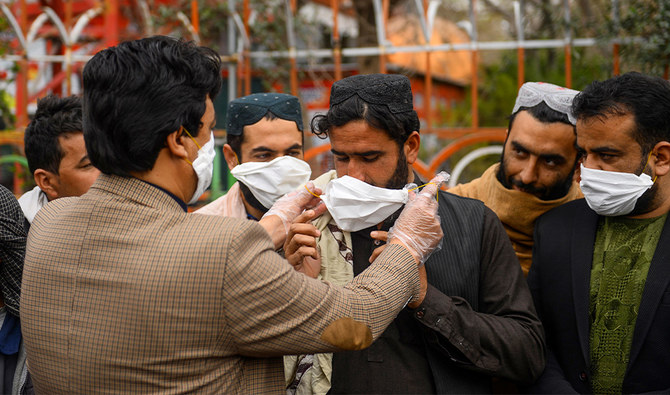
- Islamabad has closed official border crossings while Kabul has suspended all travel to Iran
- Virus has spread to more than 25 countries, killing over 2,700 and infecting 80,000, mostly in China
Pakistani premier says Saudi FM’s visit heralds ‘new era’ of strategic, commercial partnership
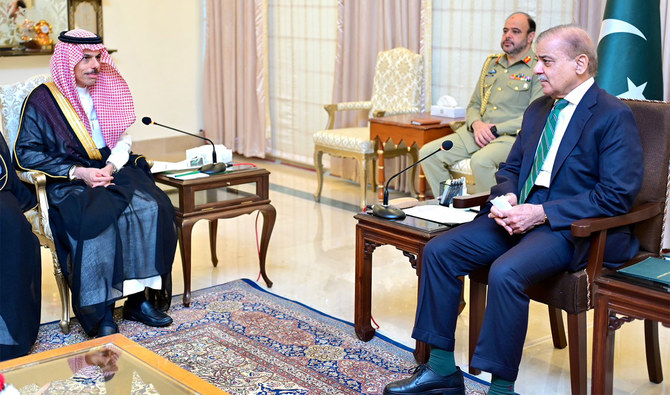
- Saudi foreign minister’s visit comes a little over a week after Saudi crown prince met Pakistani PM in Makkah
- Crown prince has reaffirmed commitment to expedite investment worth $5 billion that was previously discussed
ISLAMABAD: Pakistani Prime Minister Shehbaz Sharif said on Tuesday the ongoing visit of Saudi Foreign Minister Prince Faisal bin Farhan to Islamabad would herald a new era of strategic and commercial partnerships between the two long-time allies.
The Saudi foreign minister arrived in Islamabad on Monday on a two-day visit aimed at enhancing bilateral economic cooperation and pushing forward previously agreed investment deals. His trip comes a little over a week after Crown Prince Mohammed bin Salman met Sharif in Makkah and reaffirmed the Kingdom’s commitment to expedite investments worth $5 billion that were previously discussed.
“The visit is the beginning of a new era of strategic and commercial partnership between Pakistan and Saudi Arabia,” Sharif was quoted as saying in a statement from his office after he met Prince Faisal. “Pakistan wants to further promote cooperation in the fields of trade and investment between the two countries.”
The PM said Pakistan was taking steps to promote foreign investment and make partnerships “mutually beneficial” for allies, adding that Islamabad was grateful to the Saudi leadership for increasing investment.
Informing the Saudi delegation about the wide potential of investment in Pakistan, Sharif briefed them about the Special Investment Facilitation Council and measures the body was taking to promote investment. The body was set up last year to oversee all foreign funding.
Sharif also invited the Saudi crown prince to Islamabad.
“The people of Pakistan are looking forward to the visit of His Highness the Crown Prince Muhammad Bin Salman to Pakistan,” the PM’s office said.
“INVESTMENT PUSH“
In a statement shared with media on Monday, the Pakistan information ministry said the Saudi delegation would consult with Pakistani officials “on the next stages of investment and implementation issues.”
Saudi Arabia’s planned investment in the Reko Diq gold and copper mining project would also be discussed during the visit, the ministry said, a day after Pakistani state media reported Saudi Arabia was likely to invest $1 billion in the mine project in Pakistan’s southwestern Balochistan province, one of the world’s largest underdeveloped copper-gold areas.
Riyadh was also interested in investing in agriculture, trade, energy, minerals, IT, transport and other sectors in Pakistan, the statement said.
“As a result of this visit, Pakistan’s export capacity will increase, joint ventures will be launched and new opportunities will be paved.”
The Pakistani foreign office has said the Saudi foreign minister is expected to hold meetings with the Pakistani PM, president and members of the apex committee of Pakistan’s Special Investment Facilitation Council.
The Pakistani and Saudi foreign ministers will also address a joint press conference after a bilateral meeting scheduled for 4pm.
Pakistan and Saudi Arabia enjoy strong trade, defense and cultural ties. The Kingdom is home to over 2.7 million Pakistani expatriates and the top source of remittances to the cash-strapped South Asian country.
Cash-strapped Pakistan desperately needs to shore up its foreign reserves and signal to the International Monetary Fund (IMF) that it can continue to meet requirements for foreign financing that has been a key demand in previous bailout packages. Pakistan’s finance minister, Muhammad Aurangzeb, is currently in Washington to participate in spring meetings of the International Monetary Fund and World Bank and discuss a new bailout program. The last loan deal expires this month.
Saudi Arabia has often come to cash-strapped Pakistan’s aid in the past, regularly providing it oil on deferred payments and offering direct financial support to help stabilize its economy and shore up its forex reserves.
Last year, however, Saudi Arabia’s finance minister said the Kingdom was changing the way it provides assistance to allies, shifting from previously giving direct grants and deposits unconditionally and moving toward mutually beneficial investment deals backed by internal economic reforms.
China says ready to strengthen counter-terrorism cooperation after deadly Pakistan suicide attack
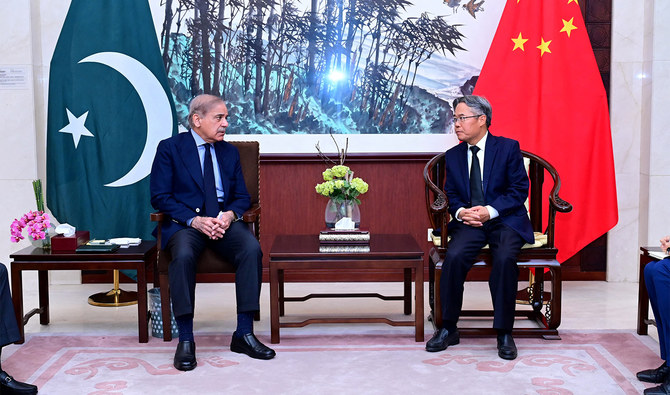
- On Mar. 26, suicide bomber hit a convoy of Chinese engineers working on Dasu hydropower project
- Five Chinese nationals and their Pakistani driver were killed in the attack in northwestern Pakistan
ISLAMABAD: Chinese Ambassador to Pakistan Jiang Zaidong has said Beijing was ready to enhance counter-terrorism and security cooperation between the two nations, Radio Pakistan reported on Tuesday, two weeks after the killing of five Chinese nationals in a suicide attack in Pakistan’s northwest.
On Mar. 26, a suicide bomber rammed a vehicle into a convoy of Chinese engineers working on a hydropower project at Dasu in the northwestern Khyber Pakhtunkhwa province, killing five Chinese nationals and their Pakistani driver.
The assault was the third major attack in little over a week on China’s interests in the South Asian nation, where Beijing has invested more than $65 billion in infrastructure projects as part of its wider Belt and Road initiative.
“China stands ready to work hand-in-hand with Pakistan to defeat the evil attempt at disrupting our cooperation,” Jiang was quoted as saying in a report published by state-run Radio Pakistan.
“We are also ready to work with Pakistan to safeguard development with security and to promote security with development … We should take the promotion of international security as a support, and further enhance China-Pakistan counter-terrorism and security cooperation.”
Jiang said all countries needed to “work together in addressing various security challenges for win-win results.”
He expressed hope that Pakistan would speed up the investigation of the Mar. 26 attack and bring the perpetrators to justice.
“We should take economic security as foundation, and continue to promote the building of an upgraded version of CPEC,” Jiang said. “For this purpose, China stands ready to further strengthen counter-terrorism and security cooperation with Pakistan, to maintain high pressure and rigorous operation, so as to decisively strike the terrorism.”
The Mar. 26 bombing followed a Mar. 20 attack on a strategic port used by China in the southwestern province of Balochistan, where Beijing has poured billions of dollars into infrastructure projects, and a Mar. 25 assault on a naval air base, also in the southwest. Both attacks were claimed by the Baloch Liberation Army (BLA), the most prominent of several separatist groups in Balochistan.
Dasu, the site of a major dam, has been attacked in the past, with a bus blast in 2021 killing 13 people, nine Chinese among them, although no group claimed responsibility, like the Mar. 26 bombing.
Pakistan is home to twin insurgencies, one mounted by religiously-motivated militants and the other by ethnic separatists who seek secession, blaming the government’s inequitable division of natural resources in southwestern Balochistan province.
Chinese interests are under attack primarily by ethnic militants seeking to push Beijing out of mineral-rich Balochistan, but that area is far from the site of the Mar. 26 bombing.
‘It’s magnificent, it’s beautiful’: Visitors flock to northern Pakistan for ‘Blossom Festival’
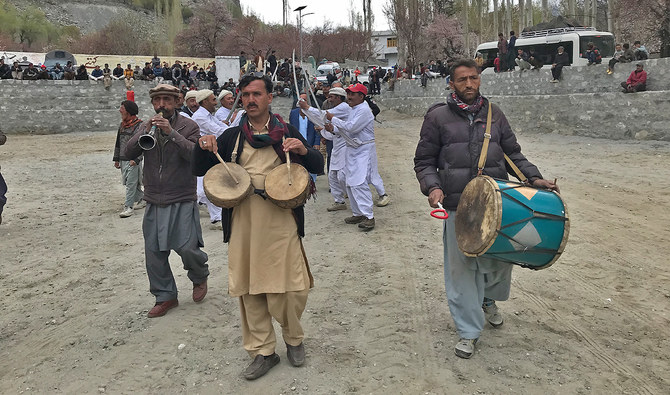
- Festival organized for the first time to promote local and international tourism in Gilgit-Baltistan region
- Area is home to thousands of apricot, cherry, apple and peach trees providing perfect backdrop to spring
KHAPLU: Hundreds of people have gathered in Khaplu valley in Pakistan’s picturesque Gilgit-Baltistan region in the last few days for a ‘Blossom Festival’ organized for the first time to promote local and international tourism.
Home to five of the world’s 14 mountain summits of at least 5,000 metres, the northern Gilgit-Baltistan region is Pakistan’s only land link to China and at the heart of the $65 billion China-Pakistan Economic Corridor (CPEC) infrastructure development program. Due to its geographic location and climate patterns, thousands of apricot, cherry, apple and peach trees are found in GB, with their beautiful colors offering the perfect backdrop to spring.
“We are holding this [Blossom] festival to celebrate the upcoming spring,” Rizwan Hussain, an assistant executive engineer at the GB Communication and Works department and a member of the event's organizing committee, told Arab News.
“The blossom festival is mainly in the Baltistan region and starts with cherry blossom as well as apricot blossom ... it’s mainly about celebrating the flowering of apricot and [other trees],” he added. “Mainly in Ghanche [district in GB], we are now celebrating apricot blossoms because cherry blossoms are very rare here."
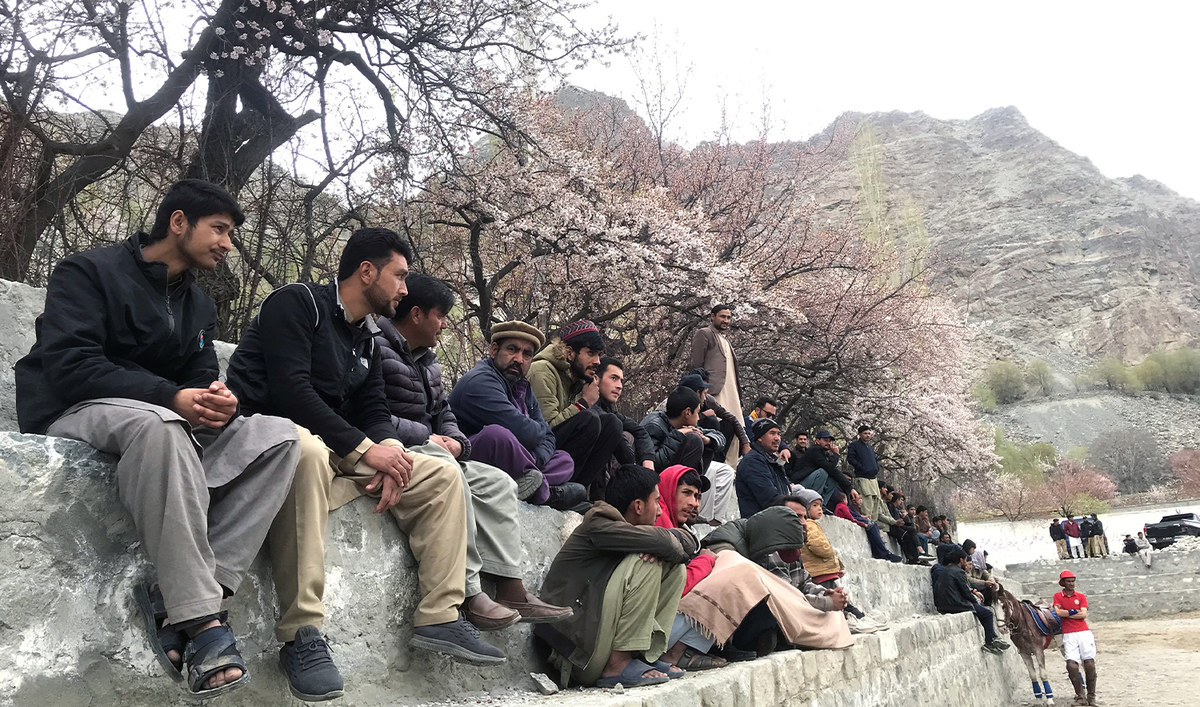
The festival also featured sword dances and other cultural and musical performances, stalls of handicrafts and polo matches.
“Different festivals, different cultural shows have been organized as part of the celebration and they have their own significance,” Hussain added.
Iftikhar Ali, an assistant commissioner in Ghanche, told Arab News the festival “signified the arrival of spring.”
“This event is celebrated annually on a local scale. But this year the district administration with the support of associated departments has decided to organize the festival at a mega-level,” he added.
Visitors, both local and foreign, marveled at the beautiful colors and cultural shows organized as part of the festival.
“April is the best time to be here,” said Tshering Digi, a Taiwanese tour guide who was visiting GB for the first time.
“We can see all the different fruits like apricots, the cherry blossom season. That’s why we are here … We see so many flowers blossoming and it’s really beautiful,” she told Arab News as she stood by an apricot tree planted in the garden of Khaplu Palace, an old fort and palace located in Khaplu, a city in Gilgit-Baltistan.
“We can see [blossoms] in our country also, but we found here that everywhere you go, every valley, riverside or village, all are blossoming with flowers, it’s magnificent, it’s beautiful.
“And the view is fantastic, you can see the magnificent Karakorum Mountain Range … you can see different flowers and colours that make everybody very happy. So I would recommend my Taiwanese people to visit here [Pakistan], especially to the northern part, to the Gilgit-Baltistan area.”
A local tourist who identified himself only by his first name Faizan said he was visiting with his parents, wife and children.
“We have come for the first time to the Skardu and Khaplu area,” Faizan told Arab News. “We are especially here to see spring blossoms ... we have seen cherry and apricot blossoms and seen really great colors in this area.”
Visitor Sidra was also in GB for the first time:
“Our experience was very good. We saw cherry blossoms … And definitely, we will recommend our friends and relatives to visit this region and observe its culture, enjoy its weather, especially in this season, and enjoy these spring blossoms.”
Pakistani charities say donations for Palestine have surpassed local causes since Oct. 7

- Al-Khidmat Foundation says donations for Palestine have increased by about 60 percent
- Baitussalam Welfare Trust also confirms its donations were now more for Palestinians
KARACHI: Major Pakistani charities have said this week they have received more donations for humanitarian aid to Palestine than for charitable causes at home since the beginning of Israel’s war on Gaza on Oct. 7.
The ongoing Israeli air strikes and ground offensive have killed more than 33,000 Palestinians with tens of thousands more wounded, and many feared still trapped under the rubble of destroyed buildings and infrastructure. The majority of Gaza’s 2.3 million people have been displaced and international aid agencies and concerned nations have warned famine is imminent.
As the human toll of the war continues to rise, Pakistani charities say people in Pakistan have “overwhelmingly” supported their efforts to provide aid to Gazans.
“The people are now contributing more for Palestine than the local cause as the flow of donations has increased by about 55-60 percent for the people of Palestine,” Syed Waqas Jafri, secretary-general of the Al-Khidmat Foundation Pakistan, one of Pakistan’s largest charities, told Arab News.
The Al-Khidmat Foundation Pakistan, which has an international footprint, distributes food stamps, runs orphanages, and does rehabilitation work during natural disasters in Pakistan.
Since Oct. 7, the organization, which was already working in Palestine through local and international partners, has expedited its efforts to collect donations and send humanitarian aid for the people of Palestine, Jafri said.
“As soon as we came to know that there is a humanitarian crisis on a large scale and the space we had in a given situation was only for food and medicine, so we worked with Pakistan’s NDMA (National Disaster Management Authority) and Pakistan Air Force to send aid,” Jafri said.
“There have been five chartered flights and the sixth one is via a vessel which has 20 containers containing 300 tons of goods. So these six consignments have gone from Pakistan. The value of the goods sent to Palestine is about Rs1.6 billion ($5.7 million).”
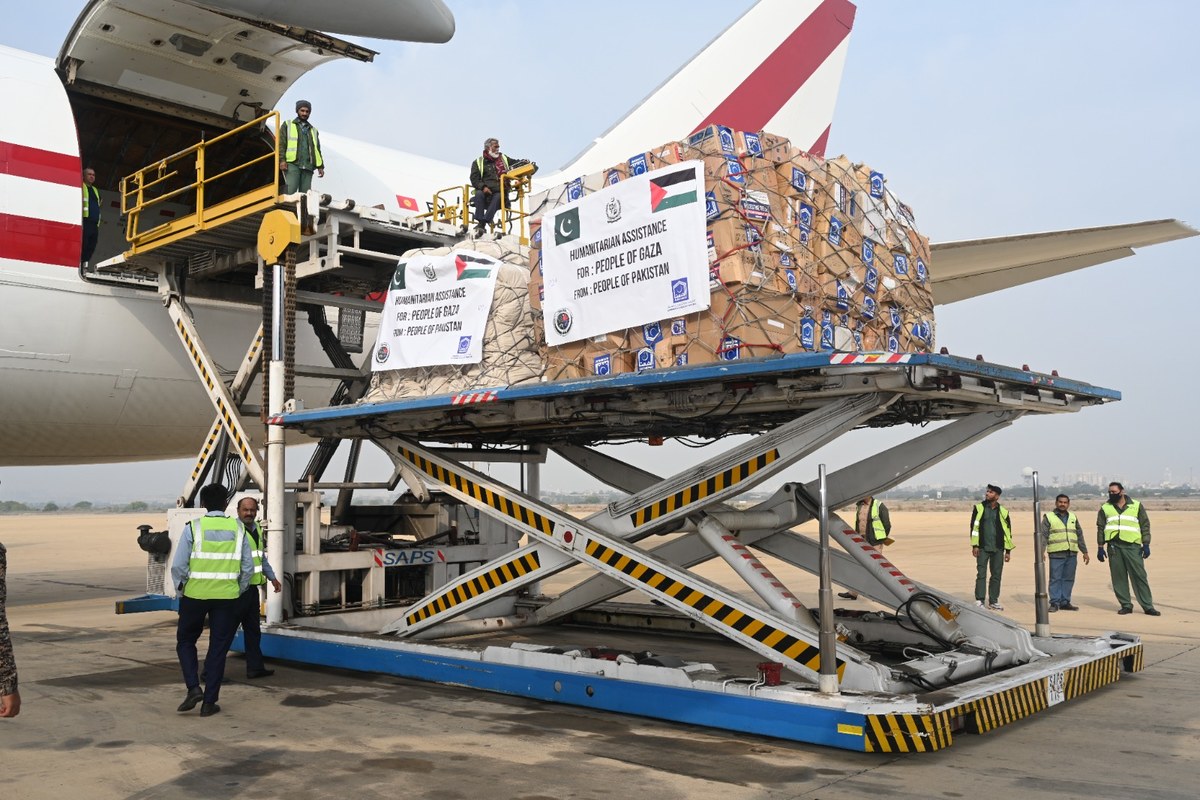
The organization has rented warehouses in Cairo and is now purchasing goods from the local market for delivery to the besieged Palestinian territory, Jafri said, adding that the need for tents had multiplied as roughly 90 percent of Gaza had been rendered inhabitable by the Israeli military actions.
The Baitussalam Welfare Trust (BWT), another non-profit organization working to provide relief to Palestinian refugees, confirmed donation inflows to the charity were now more for Palestine.
“The flow of donation is about 50-60 percent for Palestine while the number of donors has also increased in recent months,” Huzaifa Rafique, a BWT spokesman, told Arab News on Monday.
The BWT is operating in Palestine in coordination with Turkish government organizations and providing health care, education and emergency relief, Rafique said.
“The Baitussalam Welfare Trust is operating bread plants, taking care of orphans, and providing ready food to the people in affected areas,” Rafique said.
BWT also distributed cash among Palestinian children during the Eid Al-Fitr holiday last week.
Saylani Welfare International, another large Pakistani charity, also said donations were coming in for Palestine, while people were also supporting local projects.
“The flow of funds for Palestine is about 5-10 percent, while the rest of the donations are coming for local projects,” Muhammad Ghazzal, SWI chief operating officer, told Arab News, adding that his organization had so far dispatched goods worth Rs200 million for the people of Palestine.
Ghazzal said the SWI was working with Turkish and Pakistani government entities, including the NDMA, to dispatch aid via Egypt and Turkiye.
“The goods dispatched to Palestine included food, medicine and tents,” he added.
Pakistan and IMF discussing new multi-billion-dollar program, finance minister says
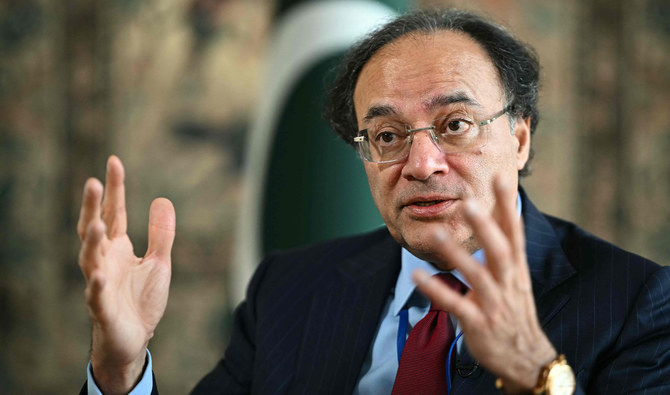
- Muhammad Aurangzeb says Pakistan will at least be requesting for a three year program to help execute structural reform agenda
- Government of PM Shehbaz Sharif tasked with engineering economic turnaround by implementing unpopular belt-tightening measures
Washington: Pakistan has initiated discussions with the IMF over a new multi-billion dollar loan agreement to support its economic reform program, its new finance minister told AFP on Monday.
The South Asian nation is nearing the end of a nine-month, $3 billion loan program with the International Monetary Fund designed to tackle a balance-of-payments crisis which brought it to the brink of default last summer.
With the final $1.1 billion tranche of that deal likely to be approved later this month, Pakistan has begun negotiations for a new multi-year IMF loan program worth “billions” of dollars, Finance Minister Muhammad Aurangzeb said during an interview in Washington.
“The market confidence, the market sentiment is in much, much better shape this fiscal year,” said Aurangzeb, a former banker who took up his post last month.
“It’s really for that purpose that, during the course of this week, we have initiated the discussion with the Fund to get into a larger and an extended program,” he added.
An IMF spokesperson told AFP that the Fund is “currently focused on the completion of the current Stand-by Agreement program,” referring to the ongoing nine-month program scheduled for completion shortly.
“The new government has expressed interest in a new program, and Fund staff stands ready to engage in initial discussions on a successor program,” the spokesperson added.
During his visit to Washington, Aurangzeb will also attend the spring meetings organized by the IMF and World Bank, which kick off in earnest Tuesday, with two clear objectives: to help countries combat climate change, and to assist the world’s most indebted nations.
The meetings — which bring central bankers together with finance and development ministers, academics, and representatives from the private sector and civil society to discuss the state of the global economy — will kick off with the IMF’s publication of its updated World Economic Outlook.
Pakistan held elections in February this year which were marred by allegations of rigging, with opposition leader Imran Khan jailed and barred from running, and his Pakistan Tehreek-e-Insaf (PTI) party subject to a crackdown.
The shaky coalition that emerged, led by Shehbaz Sharif, is now tasked with engineering an economic turnaround by implementing a raft of unpopular belt-tightening measures.
“I do think that we will at least be requesting for a three year program,” Aurangzeb said. “Because that’s what we need, as I see it, to help execute the structural reform agenda.”
“By the time we get to the second or third week of May, I do think we’ll start getting into the contours of that discussion,” he added.
Pakistan has close economic ties to both the United States and China, which has put it in a tricky position as the two countries have embarked upon a costly trade war.
“From our perspective it has to be an and-and discussion,” Aurangzeb said when asked how the Sharif government plans to conduct its trading relationships with the world’s two largest economies.
“[The] US is our largest trading partner, and it has always supported us, always helped us in terms of the investments,” he said. “So that is always going to be a very, very critical relationship for Pakistan.”
“On the other side, a lot of investment, especially in infrastructure, came through CPEC,” he said, referring to the roughly 1,860-mile long China-Pakistan Economic Corridor designed to give China access to the Arabian Sea.
Aurangzeb said there was an “very good opportunity” for Pakistan to play a similar role in the trade war as countries like Vietnam, which has been able to dramatically boost its exports to the US following the imposition of tariffs on some Chinese goods.
“We have already a few examples of that already working,” he said. “But what we need to do is to really scale it up.”
As part of the structural reform program agreed to by the previous government, Pakistan is in the middle of a privatization drive to sell off its poorly-performing state-owned enterprises (SOEs).
The first SOE on the list is Pakistan International Airlines, the country’s flag carrier.
“We will get to know in the next month or so with respect to interest from prospective bidders,” Aurangzeb said.
“Our desire is to go through with that privatization and take it through the finishing line by the end of June,” he added.
If the PIA privatization goes well for the government, other companies could soon follow.
“We’re creating an entire pipeline,” he said, adding: “Over the next couple of years we want to really accelerate that.”










